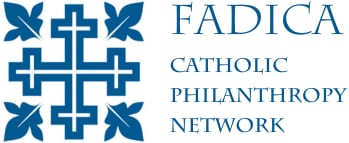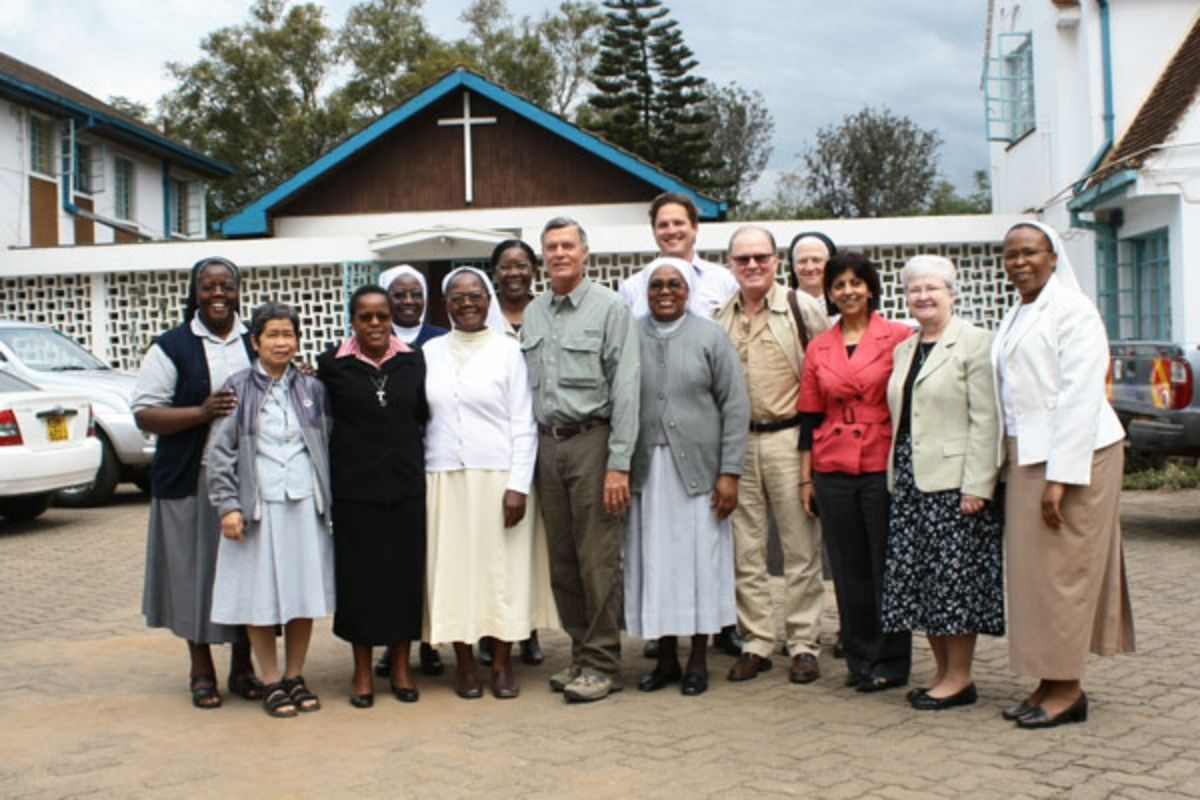It is with heartfelt respect and admiration that I thank Steve Hilton for his 30 years of dedicated service and leadership at the Conrad N. Hilton Foundation and in philanthropy generally.
This interview was conducted at his office just prior to his retirement as President and CEO, where he was generous with his time and thoughtful in his reflections on both the past and the future. FADICA is truly grateful for the contributions and inspiration the Hilton Foundation brings to our member community.
-Alexia Kelley
Alexia Kelley: Congratulations on this year and all you’ve accomplished in this time. We all have a lot to learn from the impact you’ve had and your years of service.
Alexia: Looking back over your 30 years of leadership, of what are you are most proud, and what has the Foundation’s greatest impact been in that time?
Steve Hilton: I would say the thing I am the most proud of is that I feel we have stayed true to Conrad Hilton’s vision of helping to improve the lives of vulnerable and disadvantaged people throughout the world. In particular, we’ve been true to supporting the works of the Catholic Sisters, whom Conrad mentions in his last will. He also mentions helping children, which has been another area where we have focused a great deal. In terms of impact, numbers of people touched, there are two examples that come to mind. One of them is our water program, which is mostly in Africa. As a result of that initiative we have touched the lives of over two million people, bringing clean lifesaving water.
The second example of impact — as I look back on my 30 years — is what we’ve accomplished together with the Perkins School for the Blind. This program helps multi-disabled blind children and I think that one program moves the needle on a global scale.
Both of these initiatives, clean water and blindness, are 25-year initiatives. We have been working on them for some time. When we first started with the Perkins School, there were only 9 countries that had programs for blind children with multiple disabilities. Today Perkins has some engagement with approximately 60 countries. While this may not be at the scale of our clean water program’s impact on 2 million people, 60 countries is a large number for that particular niche, which is very unique, relatively small, and, of course, serving a great need.
Alexia: I wanted to ask a question about partnerships because I was struck at the Foundation’s recent meeting of the Catholic Sisters Initiative that you work with your grantees as partners. The Perkins partnership sounds like that has been a long-term collaboration, and that it takes time for partnerships to bear fruit. Was that your experience? Does that ring true to you in terms of effective partnerships?
Steve: Yes, that is the nature of our grant making. Unlike some foundations that tend to make a grant for one year or two years and not necessarily renew it when it expires, we take a long-term approach.. For example, for our work with the Perkins School, the first grant lasted five years. The Hilton Foundation’s president at the time created a spreadsheet where his vision was to implement the initiative for another 15 years beyond the initial five years. He assumed that we would have a long-term relationship, which we did.
With respect to partnerships, another dimension of our collaboration with Perkins was that they administered sub-grants for schools for the blind, to support clinics that help the blind and to create parents’ support groups. We were able to tap into the Perkins staff’s knowledge, since their staff are people who are incredibly experienced and knowledgeable about the blindness field. Rather than have those skills inside our Foundation, we were able to delegate that, in a sense, to the Perkins staff. I think it is a partnership of trust, where we trusted their judgment and they, in turn, created these secondary partnerships through their sub-grants with our funds.
Alexia: Thank you for sharing those inspiring examples. As you look to the future, what is your hope for the Foundation’s next 30 years?
Steve: For the next 30 years I hope to be surprised and inspired by what our talented team is able to accomplish. I hope the Foundation will continue to hold true to Conrad Hilton’s and my father Barron Hilton’s philanthropic legacies. I would also hope, going forward, that the Foundation can still be a place where family comes together and works within this shared mission.
Alexia: What motivated your grandfather’s interest and generosity towards Catholic Sisters?
Steve: When you read his autobiography “Be My Guest,” you’ll definitely get a much clearer appreciation of how that came about. Conrad grew up in the New Mexico Territory and lived in a tiny little town which was on the frontier at the time. His mother, Mary Hilton, was a very devout Catholic and she made sure all of her children received education in the Catholic faith. What that meant for young Conrad is that he would go to the nearest town where there was a Catholic School to take Catechism from the Sisters who were managing the school. I think the Sisters made an impression on young Conrad, inspiring him with their selflessness and the purity of their heart. Many of his friends throughout his life were Catholic Sisters, and I think he felt that the Sisters were a great vehicle to reach the needs of those around the world. That was really what inspired him, the connection he made with Sisters when he was a young boy.
Alexia: That really speaks to the mission of the Foundation’s Catholic Sisters initiative.
Steve: That’s true and if you look at Conrad’s last will, he says “There is a natural law, a divine law that obliges you and me to relieve the suffering, the distressed and the destitute.” From the very start when he created the Foundation, his philosophy was very much a Christian-shaped humanitarian philosophy, as he calls it a divine law that is an obligation to help those in need. He goes on to say “Charity is a supreme virtue, and the great channel through which the mercy of God is passed on to mankind. It is the virtue that unites men and inspires their noblest efforts..”
It is the heart of the Foundation’s mission statement, and what’s amazing is that my father, Barron Hilton, is leaving his wealth to the Foundation. I asked him, “Dad, you are giving all of this money? What do you want to do with it? Do you have any special interests?” He said, “If it were not for Conrad, I would not have had the success I’ve had. Everything I have is thanks to Conrad and I would want to follow his wishes.”
Alexia: That’s beautiful and very inspiring. If your work and foundation continue to grow in scope in innovation, what sparks the innovation on a founding vision?
Steve: Conrad Hilton was one of the most highly respected entrepreneurial business people in America. I think we try to embrace some of that entrepreneurial spirit and innovative thinking in how we do our work here at the Hilton Foundation.
There is a great quote that we use from Conrad, which is “Think big, act big, dream big.” As a staff we are constantly looking for leverage and how can we make each dollar do more. Innovation is one way to leverage and achieve greater impact.
One example has been the Sisters Leadership Development Initiative. There is a separate group called the Conrad N. Hilton Fund for Sisters, which is independent but closely connected to us. They tend to give smaller grants, and they are very hands-on in directing where $10,000 and $20,000 can make a big difference. The Sisters Leadership Development Initiative focuses on strengthening the capacity of Sisters. It’s about project management, accounting, progress reporting, writing, leadership development – all of the skills that will enable Sisters to be more effective in their various ministries. That’s great leverage and an innovative way of supporting Catholic Sisters.
Alexia: Growing a foundation over the years and increasing its impact I’m sure has been both challenging and rewarding. What advice do you have for other family foundations who are seeking to grow and innovate, but want to keep their founder’s vision alive? They might feel the need to respond to new needs in the world, to climate change for example. What advice do you have for others about how they can both adhere to their founder’s vision and at the same time innovate and manage growth, if their foundation is increasing in size?
Steve: You could write a book on that question. In fact I am hoping to write a book, but it won’t be focused solely on that theme. It will probably look at both that question and the nuts-and-bolts of managing a foundation. I think the most important thing is staying true to the mission, whatever that might be, and always having that guiding light. If there is no mission, and the donor is still alive, the family can help that donor or donors create a vision.
Alexia: So, together with the founder they can create that vision?
Steve: Ideally. It’s obviously shaped more by the donor. But having the family’s engagement will make it much more meaningful, especially for those who come after the donor.
I think it is important to always allow some flexibility as needs change over time. If you look at most foundations in this country, they are relatively small. They give away anywhere from $50,000 to a million dollars a year. That is probably 90% of all foundations in America, including Catholic foundations. But I do think there is a difference when you get to a certain scale and the grant amounts you are giving away start to get much larger. At that point it can be helpful to have more clarity about exactly what it is you are trying to do, and to potentially justify hiring one or more staff members to help in that process. That is where having a clear mission and very clear strategies become extremely important. Otherwise, it is pretty much at the whim of the donor. When the donor is living, he or she has every right to give to whatever cause or organization they choose. But when a foundation is intending to be around for a long time, then I think it makes sense to say, “What should this foundation be about?” “What type of road map is the donor leaving for the future board of this foundation?”
Alexia: Pope Francis is challenging all people, Catholic and Non-Catholic, to do more for the poor, for the common good. What impact do you think FADICA can uniquely have at this time, in the world of faith-based philanthropy?
Steve: I am so inspired by Pope Francis and especially that one quote that was heard throughout the world: “Who am I to judge?” That was so unexpected, and he continues to surprise us with his wisdom and humility.
One thing that I have found very encouraging in his words is his emphasis on the most disadvantaged and a call to help those trapped in the greatest poverty. I would think that one role that FADICA could play is to bring that message to reality. It is one thing to say those words, but if you are actually trying to make a difference, how do you identify those with the greatest needs? Further, how do you locate the organizations that are doing the most effective and creative work in meeting the needs of those most disadvantaged populations? I would think for FADICA, there is an opportunity to really amplify the words of Pope Francis by helping Catholic foundations be more sensitive to that particular area.


